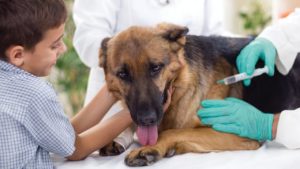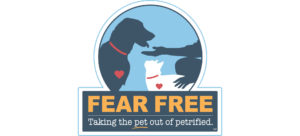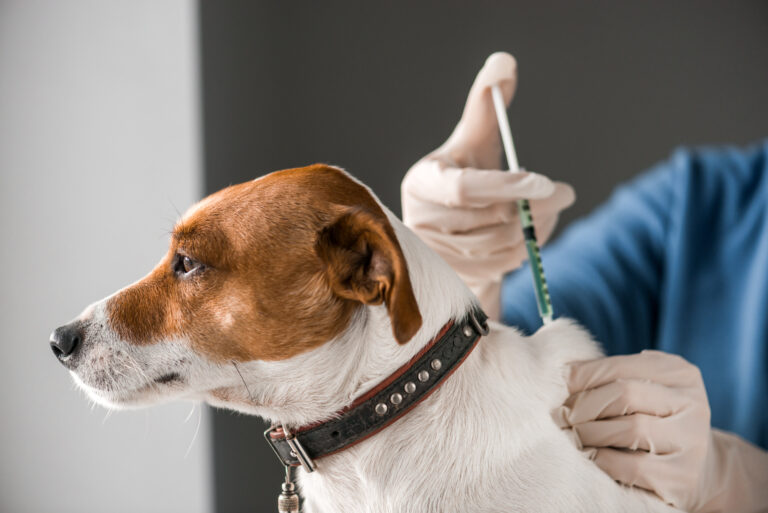A vaccine is a medical product that stimulates an animal’s immune system to produce antibodies (also known as immunity) to a specific disease, protecting the animal from that disease or lessening it’s severity if he/she were to ever be exposed to it during their lifetime. Vaccines are typically administered through needle injections, although can also be given by mouth or into the nose. Immunization plays a very important role in controlling infectious illness from spreading throughout young and adult canine populations while concurrently increasing the wellbeing and health of pets.
There are 2 different categories that vaccines fall into: core and non-core vaccines (also known as lifestyle vaccines). Both of these categories will be discussed in more detail below.
Core Vaccines:
Core vaccines are recommended to all puppies and adult dogs by the American Animal Hospital Association (AAHA). They are considered vital to the health and wellbeing of all pets.
Core vaccines protect against:
- Canine Distemper Virus
- Canine Adenovirus-2 (Hepatitis)
- Canine Parvovirus
- Canine Parainfluenza
- Rabies Virus
Non-Core Vaccines:
Non-core vaccines are recommended based on the lifestyle of each individual dog and the risk factors they will be potentially exposed to. Depending where you live, certain non-core vaccines may also be considered core in your region.
Non-core vaccines protect against:
- Leptospirosis species
Recommended if your dog has frequent access to an area where he/she may ingest or come in contact with contaminated water or soil from the urine of infected wildlife (puddles, streams, stagnant water etc…). This illness can cause severe damage to the kidneys and sometimes the liver as well if acquired. Leptospirosis is a zoonotic disease which means that it can also be passed onto humans which is another reason why it is important to vaccinate at risk pets
- Bordetella bronchiseptica or Kennel Cough
Recommended if your dog will be in close nose to nose contact with other dogs as this is how kennel cough is spread. Typically this vaccine is required if your pet will be going to grooming centers, doggy daycare, dog parks among other places where a large volume of dogs attend.
- Borrelia burgdorferi or Lyme disease
Recommended if your dog lives in an area that is endemic for ticks or often goes outside into areas that have tall grasses, bushes, or wooded areas as this vaccine is used to prevent Lyme disease in dogs which is transmitted through the bite of an infected deer tick. This vaccine works best when combined with the proper parasite prevention.
Please discuss with your veterinary team which non-core vaccines are recommended for your dog today!
When should puppy vaccines be given?
Puppy vaccines are typically recommended to begin around 8 weeks of age – this is typically the time period in which most puppies are adopted.
Prior to vaccines being given, puppies are generally protected from disease through antibodies they would have received in their mother’s milk (colostrum) while they were nursing. The reason vaccines are begun around 8 weeks of age is because this is the time period in which the effects of those maternal antibodies wear off and continued immunity needs to be achieved through the use of vaccination.
Some puppy vaccines will be required to be boostered 2 or 3 times in order for them to display their full efficacy while others will not – vaccines that need to be boostered include Leptospirosis, Lyme, and DHPP (Distemper, Hepatitis, Parvovirus, Parainfluenza). Keep in mind that all vaccine schedules may vary from animal to animal based on different factors that will be considered and discussed with your veterinarian at your puppy’s first appointment. A general puppy vaccine series is outlined below based on the puppy’s age:

8 weeks:
- DHPP (Distemper, Hepatitis, Parvovirus, Parainfluenza)
12 weeks:
- DHPP (Distemper, Hepatitis, Parvovirus, Parainfluenza)
- Bordetella
- Leptospirosis
- Lyme (At risk pets only)
16 weeks:
- DHPP (Distemper, Hepatitis, Parvovirus, Parainfluenza)
- Leptospirosis
- Rabies
- Lyme (At risk pets only)
Most vaccines will be good for one year after receiving the final dose of each above listed vaccine.
Do adult dogs need to receive vaccines as well?
Yes! Adult’s dogs are recommended to receive vaccinations as well. It is suggested that every adult dog is examined by a veterinarian at least once annually to assess their general health status – this is usually a perfect time to complete your dog’s vaccines as well! Most vaccines are required to be completed annually in order for them to display full efficacy. Some Rabies and DHPP (Distemper, Hepatitis, Parvovirus, Parainfluenza)
Vaccines may be valid for up to 3 years once your dog is an adult.

Vaccines reactions
The benefits of vaccines typically outweigh the risks of not vaccinating. Adverse reactions to vaccines are not very common although still may occur and it is important to be aware of them and be present to be able to monitor your dog at home after he/she has received his/her vaccine(s). Normal/mild symptoms may be noted after vaccination just as they can be with humans and will resolve within 12-48 hours after vaccination. These symptoms may include tenderness around the area of injection or discomfort, mild lethargy/fatigue.
Serious vaccine reactions may include the following:
- Vomiting
- Diarrhea
- Facial swelling/hives
- Difficulty breathing
- Excessive lethargy/fatigue
- Decreased appetite
- Small red, raised, itchy bumps on the body (hives)
- Persistent or severe coughing
If you are ever concerned that your pet may be having a vaccine reaction please phone the clinic immediately (519-893-8937) or the nearest emergency veterinary clinic for advice. The nearest emergency veterinary clinic in the Kitchener-Waterloo area is the Emergency Veterinary Clinic of Waterloo Region (519-650-1617).
If you would like to know more information, or schedule your new puppy/dog in for a fear free examination and vaccines with one of our friendly veterinarians, please give us a call today at 519-893-8937 – One of our approachable staff members would be more than happy to assist you!


